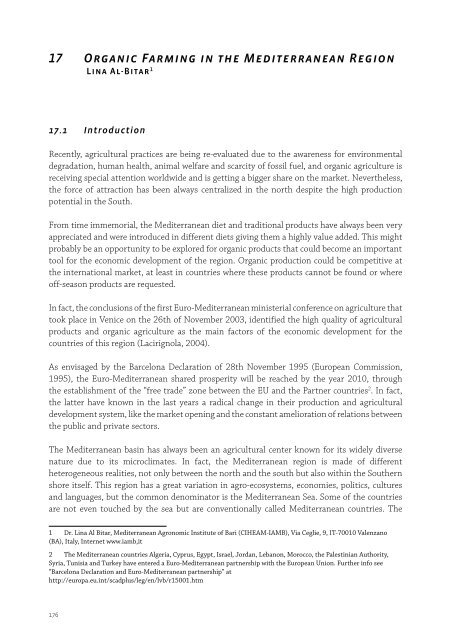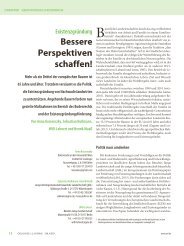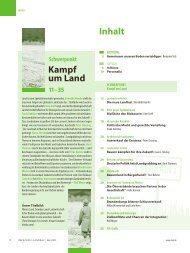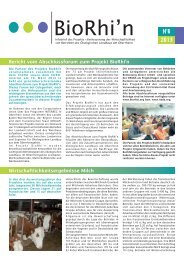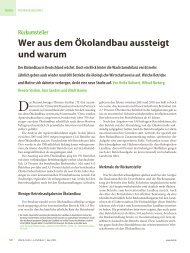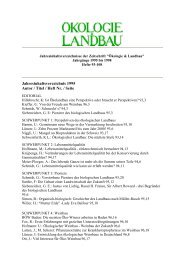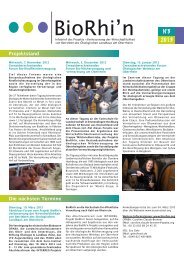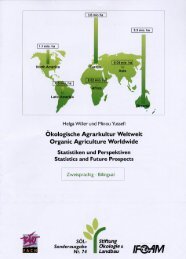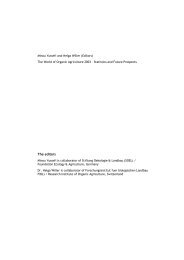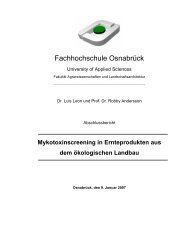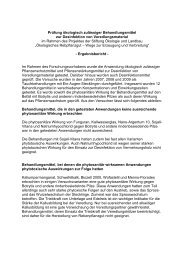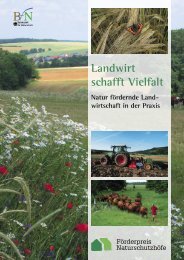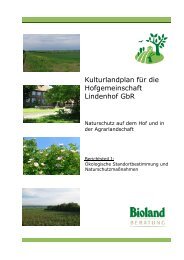the world of organic agriculture - Organic Eprints
the world of organic agriculture - Organic Eprints
the world of organic agriculture - Organic Eprints
Create successful ePaper yourself
Turn your PDF publications into a flip-book with our unique Google optimized e-Paper software.
17 <strong>Organic</strong> Farming in <strong>the</strong> Mediterranean Region<br />
Lina Al-Bitar 1<br />
17.1 Introduction<br />
Recently, agricultural practices are being re-evaluated due to <strong>the</strong> awareness for environmental<br />
degradation, human health, animal welfare and scarcity <strong>of</strong> fossil fuel, and <strong>organic</strong> <strong>agriculture</strong> is<br />
receiving special attention <strong>world</strong>wide and is getting a bigger share on <strong>the</strong> market. Never<strong>the</strong>less,<br />
<strong>the</strong> force <strong>of</strong> attraction has been always centralized in <strong>the</strong> north despite <strong>the</strong> high production<br />
potential in <strong>the</strong> South.<br />
From time immemorial, <strong>the</strong> Mediterranean diet and traditional products have always been very<br />
appreciated and were introduced in different diets giving <strong>the</strong>m a highly value added. This might<br />
probably be an opportunity to be explored for <strong>organic</strong> products that could become an important<br />
tool for <strong>the</strong> economic development <strong>of</strong> <strong>the</strong> region. <strong>Organic</strong> production could be competitive at<br />
<strong>the</strong> international market, at least in countries where <strong>the</strong>se products cannot be found or where<br />
<strong>of</strong>f-season products are requested.<br />
In fact, <strong>the</strong> conclusions <strong>of</strong> <strong>the</strong> first Euro-Mediterranean ministerial conference on <strong>agriculture</strong> that<br />
took place in Venice on <strong>the</strong> 26th <strong>of</strong> November 2003, identified <strong>the</strong> high quality <strong>of</strong> agricultural<br />
products and <strong>organic</strong> <strong>agriculture</strong> as <strong>the</strong> main factors <strong>of</strong> <strong>the</strong> economic development for <strong>the</strong><br />
countries <strong>of</strong> this region (Lacirignola, 2004).<br />
As envisaged by <strong>the</strong> Barcelona Declaration <strong>of</strong> 28th November 1995 (European Commission,<br />
1995), <strong>the</strong> Euro-Mediterranean shared prosperity will be reached by <strong>the</strong> year 2010, through<br />
<strong>the</strong> establishment <strong>of</strong> <strong>the</strong> “free trade” zone between <strong>the</strong> EU and <strong>the</strong> Partner countries 2 . In fact,<br />
<strong>the</strong> latter have known in <strong>the</strong> last years a radical change in <strong>the</strong>ir production and agricultural<br />
development system, like <strong>the</strong> market opening and <strong>the</strong> constant amelioration <strong>of</strong> relations between<br />
<strong>the</strong> public and private sectors.<br />
The Mediterranean basin has always been an agricultural center known for its widely diverse<br />
nature due to its microclimates. In fact, <strong>the</strong> Mediterranean region is made <strong>of</strong> different<br />
heterogeneous realities, not only between <strong>the</strong> north and <strong>the</strong> south but also within <strong>the</strong> Sou<strong>the</strong>rn<br />
shore itself. This region has a great variation in agro-ecosystems, economies, politics, cultures<br />
and languages, but <strong>the</strong> common denominator is <strong>the</strong> Mediterranean Sea. Some <strong>of</strong> <strong>the</strong> countries<br />
are not even touched by <strong>the</strong> sea but are conventionally called Mediterranean countries. The<br />
1 Dr. Lina Al Bitar, Mediterranean Agronomic Institute <strong>of</strong> Bari (CIHEAM-IAMB), Via Ceglie, 9, IT-70010 Valenzano<br />
(BA), Italy, Internet www.iamb,it<br />
2 The Mediterranean countries Algeria, Cyprus, Egypt, Israel, Jordan, Lebanon, Morocco, <strong>the</strong> Palestinian Authority,<br />
Syria, Tunisia and Turkey have entered a Euro-Mediterranean partnership with <strong>the</strong> European Union. Fur<strong>the</strong>r info see<br />
“Barcelona Declaration and Euro-Mediterranean partnership” at<br />
http://europa.eu.int/scadplus/leg/en/lvb/r15001.htm<br />
176


